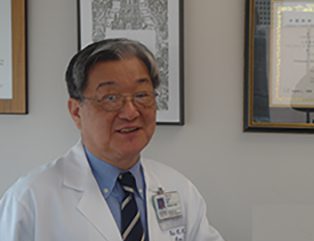University of Texas MD Anderson Cancer Center
Houston, Texas
Vice Provost for Clinical Research and Head of the Division of Cancer Medicine,
The University of Texas MD Anderson Cancer Center
Research
A national and international leader in medical oncology, Dr. Waun Ki Hong is a foremost authority on the treatment and prevention of head and neck cancer and lung cancer. His expertise spans more than 36 years of unprecedented advances in translational and clinical cancer research with expertise in the areas of genomics, cancer prevention and personalized targeted therapy.
Dr. Hong’s pioneering research has resulted in many seminal contributions in cancer medicine. He and his team have spent years studying the role of smoking in lung cancer development. Their research in this area has provided insights into why only a subgroup of smokers is prone to having their DNA damaged by smoking and, consequently, to developing lung cancer. Additionally, some lung or head and neck cancer patients with a history of smoking are at high risk for redeveloping these types of cancer even after surgical removal of their tumors. Dr. Hong showed for the first time that genetic damage to the airways can persist for many years after smoking cessation and developed measurements to identify genetically the subgroup of former smokers who are at highest risk for re-developing lung cancer. By building risk models to predict the development (and re-development) of smoking-related lung cancer, Dr. Hong hopes that those who are deemed to be at high risk could be identified and encouraged to take proactive measures early on that might prevent or delay lung cancer development.
As one of the founders of chemoprevention, Dr. Hong initiated clinical studies on curcumin and celecoxib for their potential roles in lung cancer prevention. Curcumin is a natural Indian curry spice, and celecoxib is an anti-inflammatory drug used for the treatment of arthritis. Research on these two agents may lead to their new applications in cancer chemoprevention, and may help to avoid or delay lung cancer initiation.
Additionally, Dr. Hong and his team led the landmark Veterans Administration Cooperative laryngeal preservation trial where they demonstrated the efficacy of combined chemotherapy and radiotherapy for laryngeal cancer while preserving patients’ ability to speak and swallow. Findings from this trial have changed the way laryngeal cancer is managed and has served as a model for organ preservation in many other cancers including bladder, breast and anal cancers.
In another effort, Dr. Hong was the main architect and principal investigator for BATTLE (Biomarker-integrated Approaches of Targeted Therapy for Lung Cancer Elimination), the first successful biopsy-driven trial to develop individualized targeted therapies for patients with advanced non-small cell lung cancer (NSCLC) that is resistant to chemotherapy. This formative work opened a new paradigm of personalized cancer therapy in solid tumors.
Bio
Waun Ki Hong, M.D., F.A.C.P., D.M.Sc (Hon.) received his B.S. in Engineering Science-Pre-Med (1963) and his M.D. in Medical Oncology (1967) from Yonsei University in Seoul, Korea. He completed his medical residency at the Boston Veterans Affairs (VA) Medical Center and his fellowship at Memorial Sloan-Kettering Cancer Center in New York.
Upon completing his fellowship, Dr. Hong became Chief of Medical Oncology at the Boston VA Medical Center and was a faculty member at both the Boston University School of Medicine and the Tufts University School of Medicine before joining MD Anderson Cancer Center in 1984. As a Professor of Medicine at The University of Texas MD Anderson Cancer Center, Dr. Hong served as Chairman of the Department of Thoracic/Head & Neck Medical Oncology from 1993-2005; Head of the Division of Cancer Medicine from 2001-2014; and Vice Provost of Clinical Research from 2012-2014.
Throughout his career, Dr. Hong has received numerous honors and awards, including the AACR (American Association for Cancer Research) Richard and Hinda Rosenthal Memorial Award and the Joseph H. Burchenal Memorial Award; the American Cancer Society Clinical Research Professorship, a lifetime award which at the time had been presented to only seven others in the country; the Samsung Distinguished University Chair in Cancer Medicine; the Ho-Am Prize in Medicine from the Samsung Foundation in Korea; the Gold Medal of Paris from the International Congress on Anti-Cancer Treatment; and many more. He is also an elected member of the Institute of Medicine (IOM) of the National Academies and an elected Inaugural Fellow of the American Association for Cancer Research (AACR) Academy. In 2017, the American Association for Cancer Research (AACR) announced the AACR-Waun Ki Hong Award for Outstanding Achievement in Cancer Research to recognize a worthy cancer researcher who has conducted highly meritorious laboratory, translational, or clinical cancer anywhere in the world at a relatively early state in his or her career.
Dr. Hong has authored more than 685 articles in prestigious scientific journals and edited 11 books. He was a founding editor of Head and Neck Cancer: A Multidisciplinary Approach and Editor-in-Chief of Holland-Frei Cancer Medicine, 8th Edition. He has also served on the editorial boards of 17 scientific journals.

Areas of Focus
Cancer Types
Years of NFCR Funding
1998 – 2013










